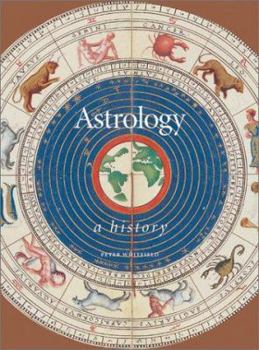Astrology: A History
Select Format
Select Condition 
Book Overview
This history traces the key role astrology has played in the mainstream of Western intellectual life for more than two millennia. Peter Whitfield relates astrology to the religion, philosophy and science of different periods in history, from ancient and classical through medieval to modern times. He shows how Western astrology evolved among different cultures and reconciled itself with many different belief systems.
Format:Hardcover
Language:English
ISBN:0810942356
ISBN13:9780810942356
Release Date:September 2001
Publisher:Harry N. Abrams
Length:208 Pages
Weight:2.94 lbs.
Dimensions:1.0" x 8.8" x 11.8"
Grade Range:Grade 8 to Postsecondary
Related Subjects
Astrology History New Age Occult Religion Religion & Spirituality Spirituality WorldCustomer Reviews
1 rating
An extraordinarily attractive historical intro to Astrology
Published by Thriftbooks.com User , 20 years ago
This solid, amazingly attractive history of Astrology is quite possibly the best overall book on the subject currently available in English. Although it does not replace the superior A HISTORY OF WESTERN ASTROLOGY by Jim Tester, the latter does not deal with every epoch in the history of the subject since Tester did not live to complete his work. Whereas Tester begins with the Greeks and largely ends in the Renaissance, Whitfield continues into the early modern period with the demise of Western Astrology due to the parallel collapse of the Aristotelian scientific worldview upon which astrology depended. Whitfield also focuses on the semi-revival of astrology in the 19th and 20th centuries, which has only a very superficial connection with classical Western Astrology, superficial because the scientific worldview that made astrological influences scientifically tenable to educated individuals is no longer in place. Whitfield is not an original researcher, in the sense that he has blazed new trails in the study of astrological history, but he seems to be familiar with all of the basic materials and historians in the field of study. He does an admirable job of explaining both the scientific assumptions of the originators of the astrological synthesis that took place in Hellenistic Egypt in the two or three centuries from 200 B.C. onwards that established most of the key elements of Western Astrology. He provides clear and coherent discussions of all the major figures from Ptolemy to William Lilly. He correctly understands that astrology was not directly refuted by its various critics over the centuries, but fell only after the scientific worldview upon which it depended collapsed. Astrology fell out of favor after the 17th century because the work of such scientists as Gallileo and Robert Boyle made Aristotelianism untenable. The book is outstanding not only for its precise and coherent narrative, but for the host of attractive illustrations. Though the text makes it one of the finest surveys of the history of astrology in English, the illustrations make the volume as attractive as many coffee table books. These illustrations are not mere window dressing. They show how intimately astrological concerns were bound up with the way both intellectuals and everyday folk conceptualized the universe from 200 B.C. to the 17th century. I will add that Whitfield is clearly an agnostic regarding the claims of astrology. If one is an ardent believer in astrology, one might find this aspect of the book offputting. Nonetheless, even for true believers in astrology, this fine volume will remain essential as a superb summary of scholarly and academic study of the birth, development, continuation, and eventual collapse of Western Astrology.





